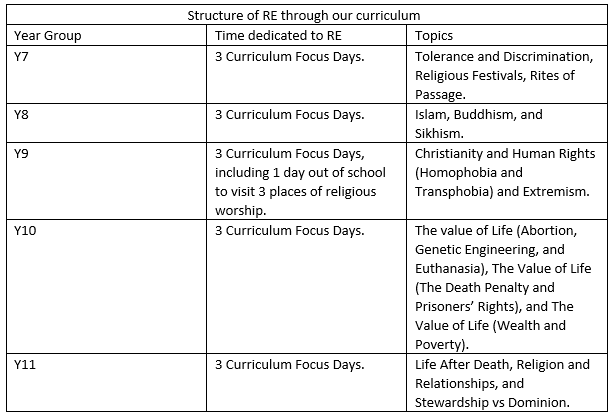RE
The aim of the RE curriculum is to engage, inspire, challenge, and encourage pupils, equipping them with the knowledge and skills to answer challenging questions. Religious Education contributes significantly to the moral fiber of the school and enables pupils to ask deep and often searching questions about their own faiths and beliefs, and the beliefs, faiths and opinions of others regarding pertinent contemporary moral issues. Pupils will be able to deepen their understanding of God as encountered and taught by different religions. The teaching of RE makes links between the beliefs, practices and value systems of a range of faiths and world-views studied. The RE curriculum will help to develop responsibility and respect for all aspects of diversity, whether it be social, cultural, and religious, and prepare pupils well for life in modern Britain.
Our curriculum will:
Develop the character of all students
-
Pupils will develop confidence in becoming courageous advocates, challenging injustice and suffering in the world and through personal experience, foster empathy and tolerance within a diverse world.
-
Teaching of the Golden Rule which is upheld by all religions, and other religious stories and parables will instill and reinforce the qualities of kindness and tolerance and support the need for equality for all.
-
Through the teaching of Stewardship, pupils will develop care and respect for each other and the world in which they live.
Ensure all students are literate and numerate
-
Pupils will confidently articulate justified opinions on ethical issues, giving personal, religious and non-religious views.
-
RE uses deep reading and listening exercises to invite students into an evaluative discourse on the significance of other ways of life in different parts of the world.
Build knowledge and aspirations of all students
-
Pupils will be able to explain in detail how religious teachings in a variety of religions can be applied to contemporary moral issues such as euthanasia, abortion, abuse of the world and the use of capital punishment.
-
RE lessons should provide a ‘safe space’ and a suitable climate for younger and older students to navigate some of the deeper, more treacherous questions about existential matters.
-
Students will have the opportunities to assimilate and evaluate a wide range of contemporary beliefs from the religions studied (Hinduism, Christianity, Buddhism and Islam) and interrogate those beliefs to ask searching and pertinent questions.
Ensure all students have the secure foundations to progress into further education and employment
-
Students are encouraged to see the skill sets they develop in RE as transferable across the school and to the world of work.
-
RE provides a good background for any career where understanding people is an asset. Employers like to know that applicants have thought a bit about themselves and their place in the world.
Develop cultural capital of all students
-
Religious education would allow students a chance to appreciate and wonder at the diversity of human achievements and the extraordinary range of human everyday practices.
-
Religious education would give students a sophisticated understanding of the impact, both positive and negative, that religious belief can bring to a person’s life.
-
Students can develop an aptitude for dialogue so they can participate positively in society.
Ms M Staniforth
Curriculum Leader for RE
Religious Education KS3
| Main skills developed in Key Stage 3: | |
|
|
| How parents can help to support their son's/daughter's learning in Key Stage 3: | |
|
|
|
Developing skills: You will:
|
|
Religious Education KS4In Year 7 and 8 students will complete a series of three Curriculum Focus Days, which pull together a series of classroom-based lessons and external visitor sessions.
Outline of Course Content: This is a course of study, where students are exposed to a wide variety of topics that are relevant to our current society. These topics include the diverse nature our society and the key theological questions that surround different communities. In Year 9, 10 and 11 students will complete a series of three Curriculum Focus Days, which pull together a series of classroom-based lessons and external visitor sessions. The content is delivered in a series of units, which incorporate topics ranging from human rights, to sexuality and extremism . Alongside this content, students are able to develop a range of transferrable skills, such as reflective learning, teamwork and effective participation, and independent enquiry. As a result, RE aims to prepare a young person leaving Hungerhill at sixteen with the skills, knowledge and awareness to navigate our diverse society".
Careers using REThe study of Religious Education can help to provide the background knowledge and understanding required for a wide range of career opportunities. There are many job roles where the study of RE helps to provide a suitable insight.
You may wish to become very committed to your religion and work as a leader for that faith. This is very demanding and requires considerable dedication. The title given to this role will vary depending upon your faith.
Dedicated religious work can also involve roles with the following; hospitals, the prison service, universities, schools, and the Armed Forces. This work is usually providing spiritual and moral guidance during times of difficulty. This is often delivered privately to individuals, but can also involve working with groups of people.
RE relates to many roles which require an understanding of people and a perspective on world affairs. Given the subject looks in detail at the beliefs of a wide range of people from diverse backgrounds, it can provide supporting knowledge for the following work areas:
However the above roles will also require further bespoke professional qualifications.
Getting started and progressing:Religious studies at A-Level is offered by several local sixth forms. This can be combined with other subjects to make a complete timetable. Progression to degree level study is available in Religious Education and Theology. These subjects are also offered, with others, by several Universities to produce a ‘joint honours’ degree.
For those wanting to work as a representative of their faith, voluntary work and community involvement is usually required and represents a good starting point.
|



